The governor of Maryland’s chief of staff leans on experience as CEO in his new role
- Oops!Something went wrong.Please try again later.
Roots in Maryland, Rhodes scholar, executive producer of a documentary, and an affinity for service as a tool for social uplift. All of those aspects describe the state’s new governor, Wes Moore. But they also mirror components of the man organizing his administration as chief of staff.
Fagan Harris’ new job is a contrast to his early employment, couriering copies of the Maryland Gazette on a paper route he had as a kid. These days, instead of delivering the news, he’s helping to shape it as the person managing the day-to-day operations of the governor’s office.
While slinging the Gazette newspaper might show his Maryland bona fides, his most recent position as president and CEO of Baltimore Corps, a social enterprise organization that he founded in 2013, shows what he might be able to do for the state from Annapolis.
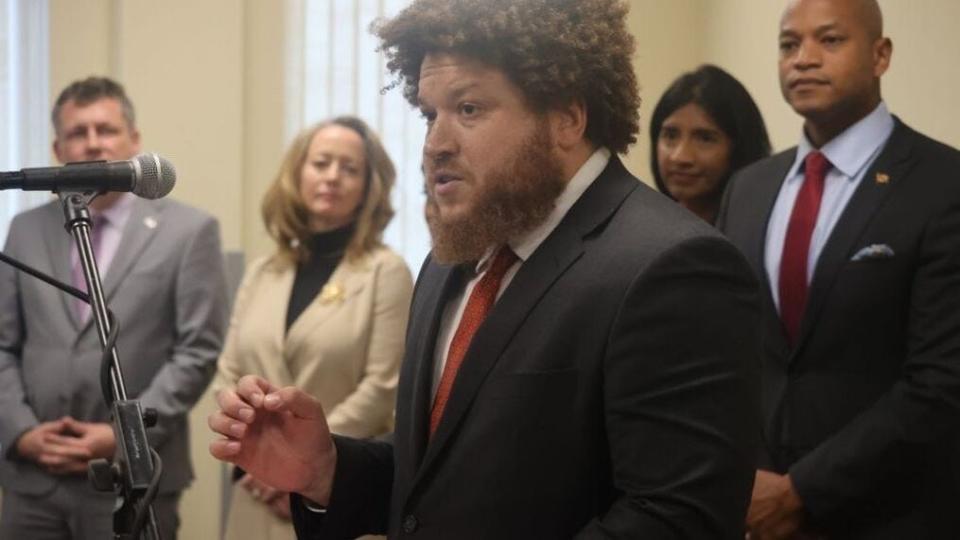
“That same organizational skill that he used in his former position,” said Sen. Mary Beth Carozza, R-Lower Shore, a former chief of staff for two members of the U.S. Congress, “he can now basically transfer to his position as a chief of staff.”
The connection between his present role and his past one registers with Harris too.
“We’re very much in startup phase of this government,” said the chief of staff, during a March 22 phone interview, a few months into the job, “and so that is very familiar to me from my Baltimore Corps days.”
Bringing connection to a broader Maryland
Like Harris, Hagerstown Del. Brooke Grossman, D-Washington, is new to the Annapolis scene. She recalls meeting him on the day she was sworn in alongside dozens of other delegates in January. Her first encounter left an impression on her.
“He knew who I was,” said Grossman, “and he already knew what was important to us (in Hagerstown).”
Their initial conversation included a discussion about keeping in Moore’s budget the $100 million in funding that the previous governor proposed for improvements to Western Maryland’s portion of Interstate 81, Grossman said.
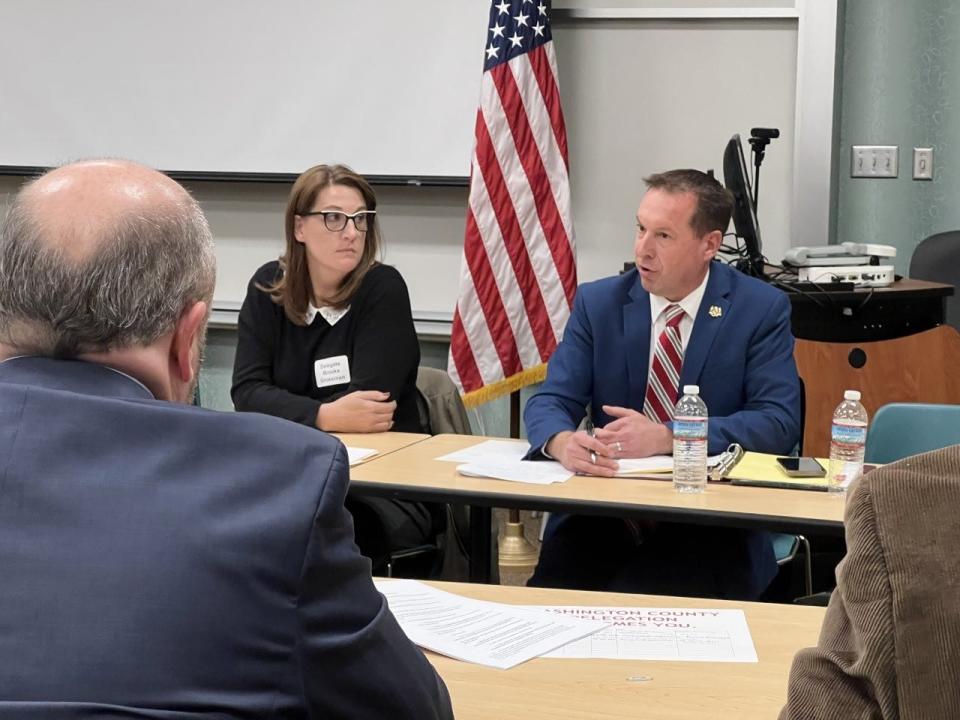
“We hear this at home all of the time, that we’re kind of left behind for the big cities, and I didn’t feel that at all,” she said of their first conversation. “I didn’t feel like I needed to explain to him what was important. He already got it.”
For Harris, who attended kindergarten through 12th grade in Maryland before attending Stanford University in California for college, he’s on the frontlines of the governor’s effort to have an expansive view of the state, both fiscally and administratively.
“We (in Maryland) are more than just the core of the state, which is what we focus on kind of in our media and our culture and our conversation,” Harris said. “We really try to reflect that in the governor’s budget, to make sure that we’re investing equitably across the state.”
The Washington County delegates thanked the administration in January for including the I-81 funding. The administration also has backed a bill to help bring broadband internet to more remote areas of Maryland.
More:Boarding the bus to the 21st century: Somerset County brings broadband to over 1,000 locations
The biggest connection that the Moore administration might bring may not be WiFi or roads, however, but rather the bonds between the government and the people. The governor has testified in support of his legislation before the General Assembly, a noted difference by legislators of both parties, from his predecessor. The administration is also holding its cabinet meetings across the state, meeting first in Baltimore County in February and Frederick County in March.
“The goal is to hit every jurisdiction across the state of Maryland obviously this year,” Harris said. “That’s what I mean by we’re doing it differently.
“We’re creating a new rhythm for the state government, and a new way of working,” he said.
‘Fagan could see the spark in me’
Where that rhythm and approach comes from appears to be "Charm City," both the name of the PBS documentary that Harris executive produced alongside his wife, a filmmaker, and the location where he started his organization, Baltimore Corps, leading it for almost a decade until taking the chief of staff role.
What started in 2013 as an insight to connect mission-driven professionals with positions that would scale their social justice impact in the city through training and professional development, received a new impetus after a young Black man was killed while in police custody in 2015.
“Following the Freddie Gray uprising, Baltimore Corps had this novel idea that you can support people at the time from West Baltimore who have ideas about how to move forward,” said Brittany Young, a native Baltimorean who received the Corps’ inaugural award and a $10,000 planning grant to start her own non-profit in the city. Her idea focused on dirt bikes and their connection with programming for science, technology, engineering, and mathematics education.
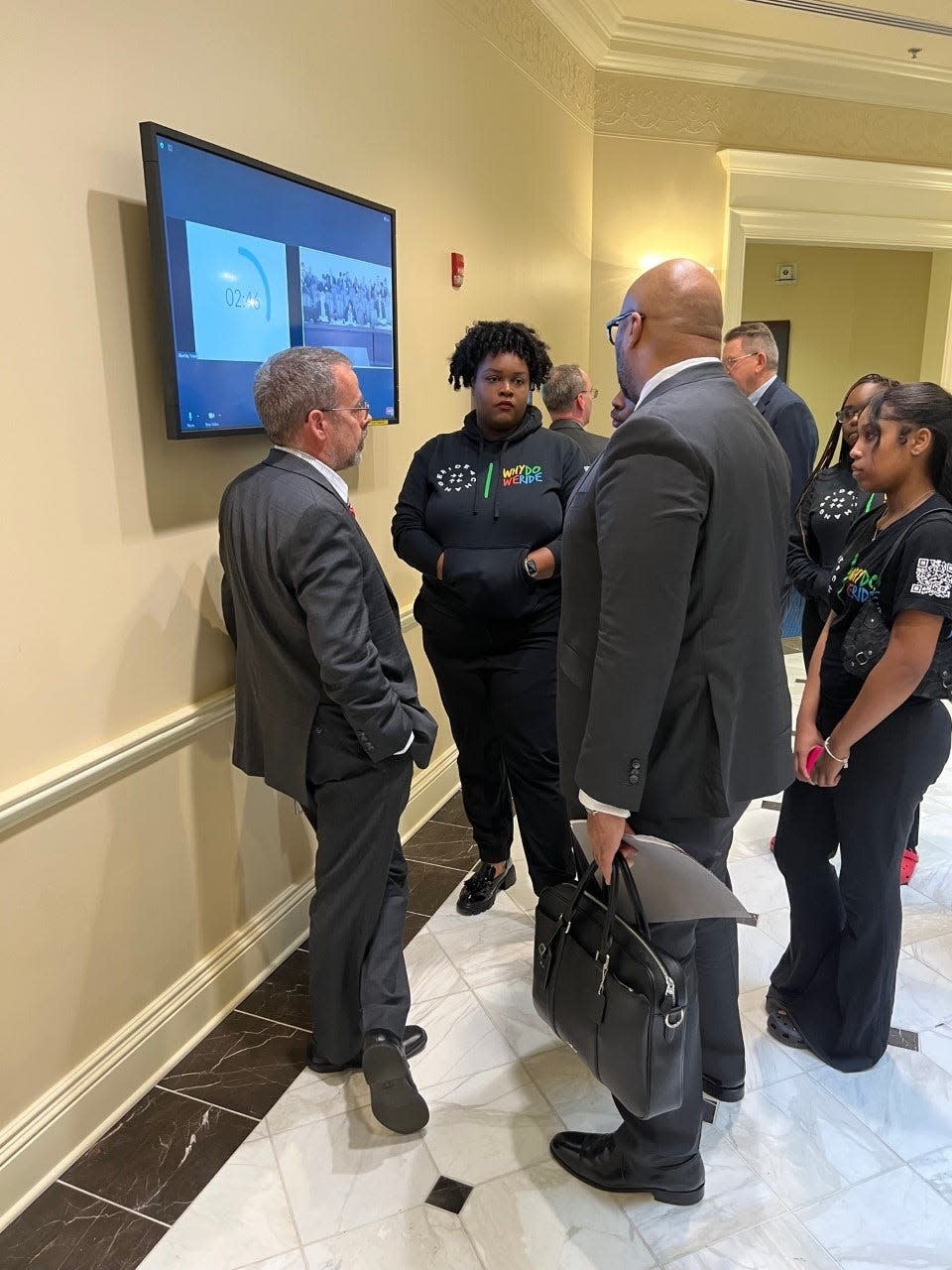
Young, once a chemical engineer, recalls submitting the application for the Corps’ Elevation Award at around three o’clock in the morning and not expecting to be selected for the award.
“Fagan could see the spark in me,” said Young, founder of B-360, in a phone interview. Her organization is set to receive $3 million in federal funds this year to increase staffing and acquire a permanent campus for the group that has, since its inception, reached 9,000 individuals, currently operating programming in 12 Baltimore rec centers, three libraries and two schools.
Another beneficiary of Baltimore Corps may be citizens of the state of Maryland, depending on the success of the administration. Moore served the founding board chair of the startup, growing the relationship between the two Rhodes scholars nearly a decade apart.
‘I’m doing everything I can to help build the scaffolding to support his vision’
One area of the nascent administration that has been particularly affected by the pair’s Baltimore Corps-bond is the governor’s service initiative, including the construction of a new department of service and civic innovation.
“The work in Baltimore Corps that I did in partnership with the governor, the founding board chair of it, was absolutely great training for this,” Harris said. “We’re literally building a government agency. We’re standing up a whole new kind of organ of government.
“I’m doing everything I can to help build the scaffolding to support his vision,” the former Baltimore Corps president said.
Moore’s vision, dating at least back to the campaign, has been to “be the state that’s going to bring a service-year option for every single high-school graduate.” With approximately 58,000 high school graduates in Maryland each year, the work to turn that vision into policy and practice is immense.
More:Moore calls for gap service year after high school. What could it mean for Maryland?
“His experience and knowledge is a tremendous benefit not only to me, but to every aspect of the office,” said Moore, in a statement, highlighting specifically the benefit of Harris’ experience during the creation of the service year program.
On his first full day in office, Moore signed an executive order to create the new service department. Discussions have proceeded in the Legislature about codifying the cabinet entity as bills to establish the service program make their way through the legislative process.
All the while, Harris, U.S. Senate-confirmed in 2021 as a board member of the national volunteering agency AmeriCorps, has been at work building the bones of the 18-member organization, budgeted for $13.6 million in Moore’s proposal for next year.
More:Gov. Wes Moore's first official actions involved ethics, service and money. What to know
In addition to the search for a secretary for the department, Harris said he has been involved in: “everything from opening the bank account, to hiring the team, setting the regulations that govern the agency, setting its goals, its metrics, what it’s going to do in its first year, what it’s going to do three years, what it’s going to do in 10 years.”
Harris said the governor will make a final decision on the secretary of service this week.
The new department runs more than $4 million more than the previous governor spent on an office overseeing volunteerism. Like with his previous position, Harris has been focused on not only the day-to-day, but the purpose.
“The values of creating an equitable service experience that’s deeply rooted in people’s communities so that service is accessible to everyone, and that it leads to meaningful career opportunities, meaningful education opportunities,” he said. “That’s really what it’s about.”
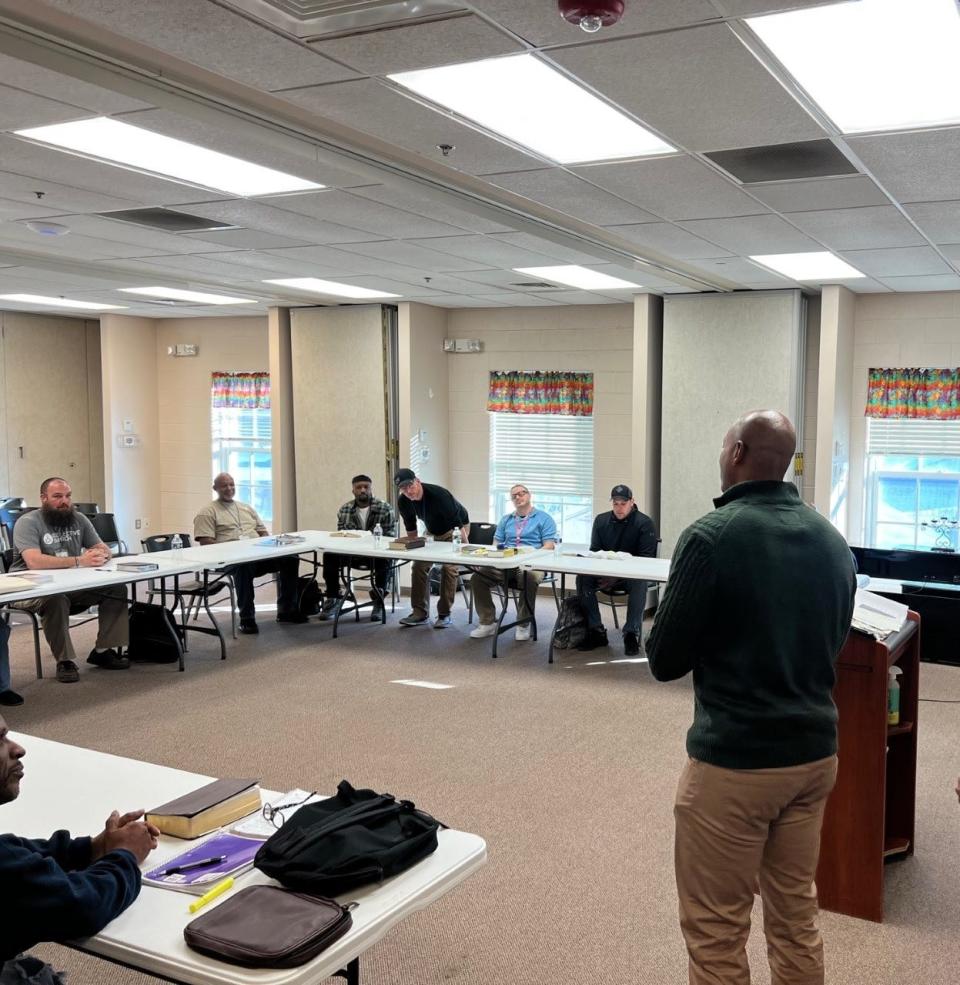
“And that’s something that we learned it at Baltimore Corps,” the new chief of staff said, “and now we have the opportunity to take it statewide.”
Lessons from a former chief of staff
As Harris begins the role, a chief of staff from the last administration remains wanted by U.S. marshals after skipping a court date earlier this month related to financial improprieties while in government.
The Lower Shore’s Sen. Carozza, who served as Republican Gov. Robert Ehrlich’s deputy chief of staff, called being in a chief of staff position or an elected position “very humbling” during a March 21 phone interview.
She said she's in the process of setting up a formal meeting with Harris to discuss a couple of issues in her district.
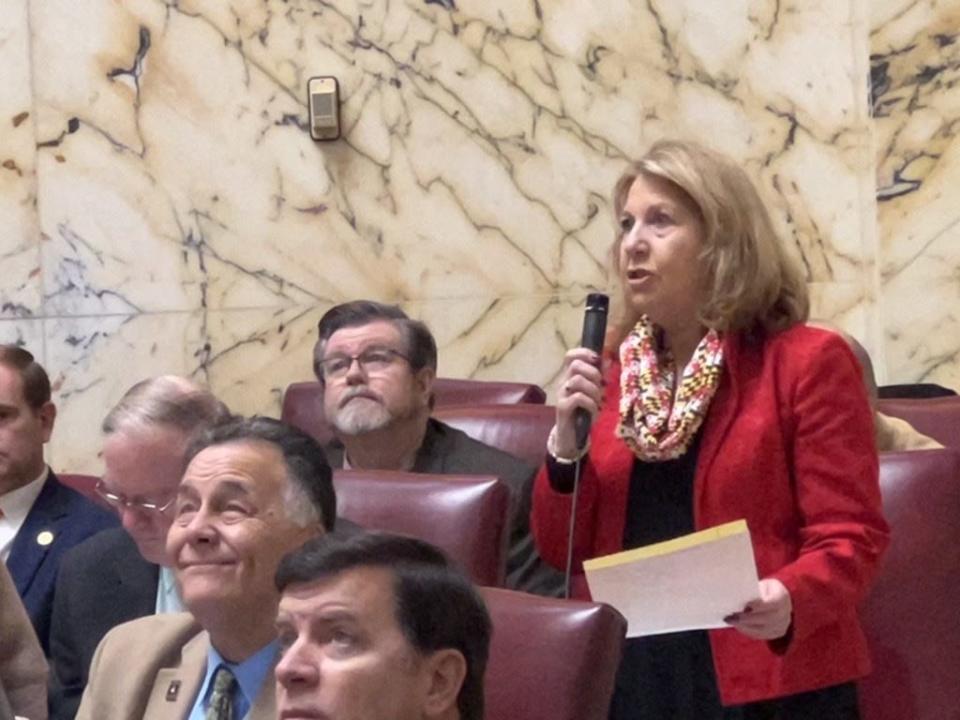
Before becoming a state legislator and serving in the Ehrlich administration, Carozza recalls a meeting she had with a former chief of staff for the governor of Ohio to learn the role she took.
“As long as you put public service first, then you know you’ve done everything you can to support your constituents,” Carozza said. “The chief of staff has to bring all the pieces together.”
Dwight A. Weingarten is an investigative reporter, covering the Maryland State House and state issues. He can be reached at dweingarten@gannett.com or on Twitter at @DwightWeingart2.
This article originally appeared on The Herald-Mail: The governor of Maryland’s chief of staff leans on past role as CEO

